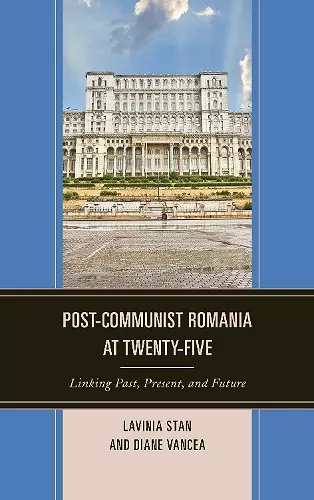Post-Communist Romania at Twenty-Five
Linking Past, Present, and Future
Lavinia Stan editor Diane Vancea editor
Format:Hardback
Publisher:Bloomsbury Publishing PLC
Published:24th Jun '15
Currently unavailable, and unfortunately no date known when it will be back
This hardback is available in another edition too:
- Paperback£42.00(9781498501118)

2014 marked the 25th anniversary of the collapse of communist regimes in Eastern Europe. The events of 1989 are widely seen as having ushered in new all-encompassing reforms in almost all areas of life. In few other places were reforms more contested and divisive than in Romania, a country that suffered greatly under the sultanistic-cum-totalitarian dictatorship of Nicolae Ceausescu, faced the region’s only bloody anti-communist revolt, and as such had the longest to travel on the road from communism to democracy. We now have a generation’s worth of experience with these wrenching reforms that have deeply affected Romania’s political institutions and political culture, and ultimately allowed it to become a member of the coveted European Union club. This volume gathers key lessons for democratic theory and practice from Romania’s first twenty-five years of post-communist transformation. Written by leading experts in the field of Romanian Studies, the chapters focus on the most important factors that have shaped the country’s political transformation during the first 25 years of post-communism.
A comprehensive view of Romania 25 years after the collapse of Ceausescu’s regime is presented in this collection edited by Stan and Vancea. The book is organized into four parts. In the first part, contributors take note of the period immediately following the removal of Ceausescu, including letters from Romanian citizens in the 1989–1990 period detailing fears and hopes for Romania’s future. The second part takes on issues of identity, political participation, and the media, and the third part focuses on political issues such as representation, parties, and political institutions. The influence of the EU on Romanian human rights and environmental measures is considered in the final part of the book. The chapters present first-rate scholarship from some of the most well-known experts in this area and a great deal of methodological diversity as well. The diversity in methods and content is a definitive strength of the book. Marius Stan and Vladimir Tismaneanu’s chapter on coming to terms with the communist past stands out. Though the focus of the book is on Romania, much is applicable to the other post-Communist countries in the region. Summing Up: Highly recommended. Graduate and research collections. * Choice Reviews *
This new book ably edited by Lavinia Stan and Diane Vancea brings together timely contributions from younger and more established scholars from two continents that shed fresh light on the evolution of the fledgling Romanian democracy after 1989. It reminds us that Romania’s image and transition to democracy must be linked to the absence of market reforms and the lack of a vibrant civil society under communism. The book also demonstrates that the rapid proliferation of political parties after December 1989 brought about a weak form of pluralism that was not conducive to genuine political competition. The new political parties had weak constituencies, little grass-roots support, and lacked well-defined doctrines and internal discipline. The volume also points out several directions in which Romania must still make progress in order to catch up with its neighbors in the West. It will be of interest to political scientists, sociologists, and historians as well as to those studying Eastern Europe and transitions to democracy. -- Aurelian Craiutu, Indiana University, Bloomington, Assistant Professor, Department of Political Science
This timely volume marks the 25th anniversary of the collapse of the communist regime in Romania and explores the evolution of Romanian democracy by addressing the social and institutional development of the country since 1989. The editors have selected key themes which guide us on Romania's democratic journey, and the contributors to the volume are some of the best scholars on Romania, providing important insights to the country's political transformation. For anyone interested in understanding Romania's democratic transition and the role that state, non-state and international actors have played, this is a must read. -- Steven D. Roper, Nazarbayev University, Astana, Kazakhstan
ISBN: 9781498501095
Dimensions: 236mm x 161mm x 27mm
Weight: 599g
324 pages